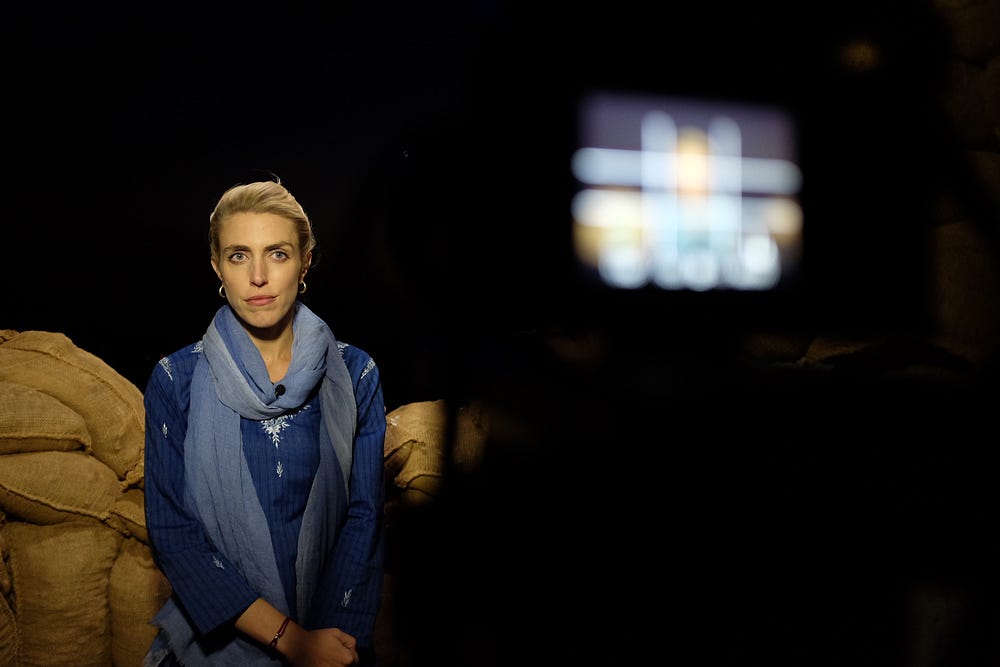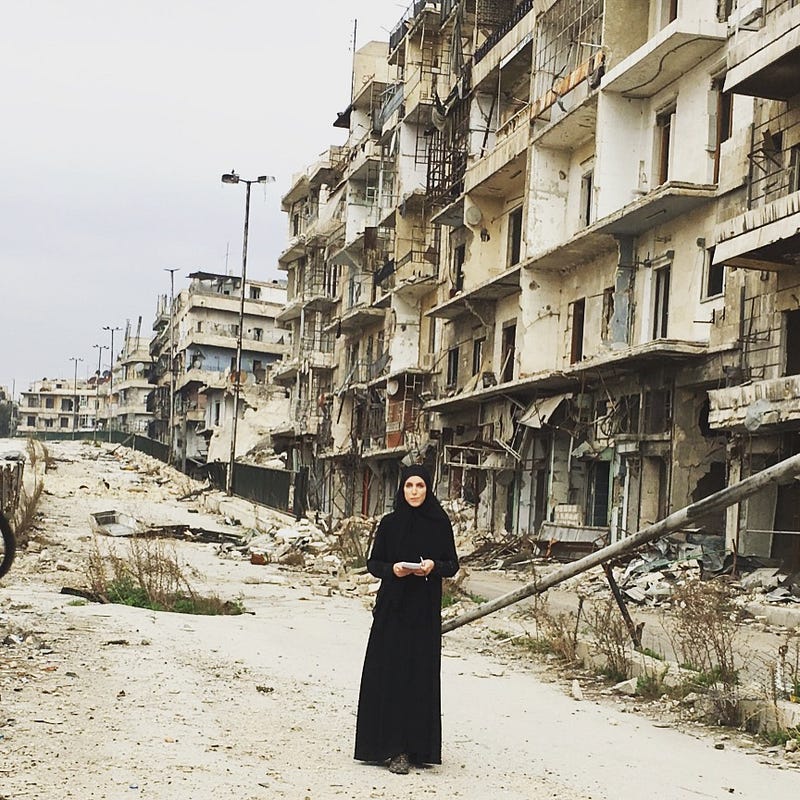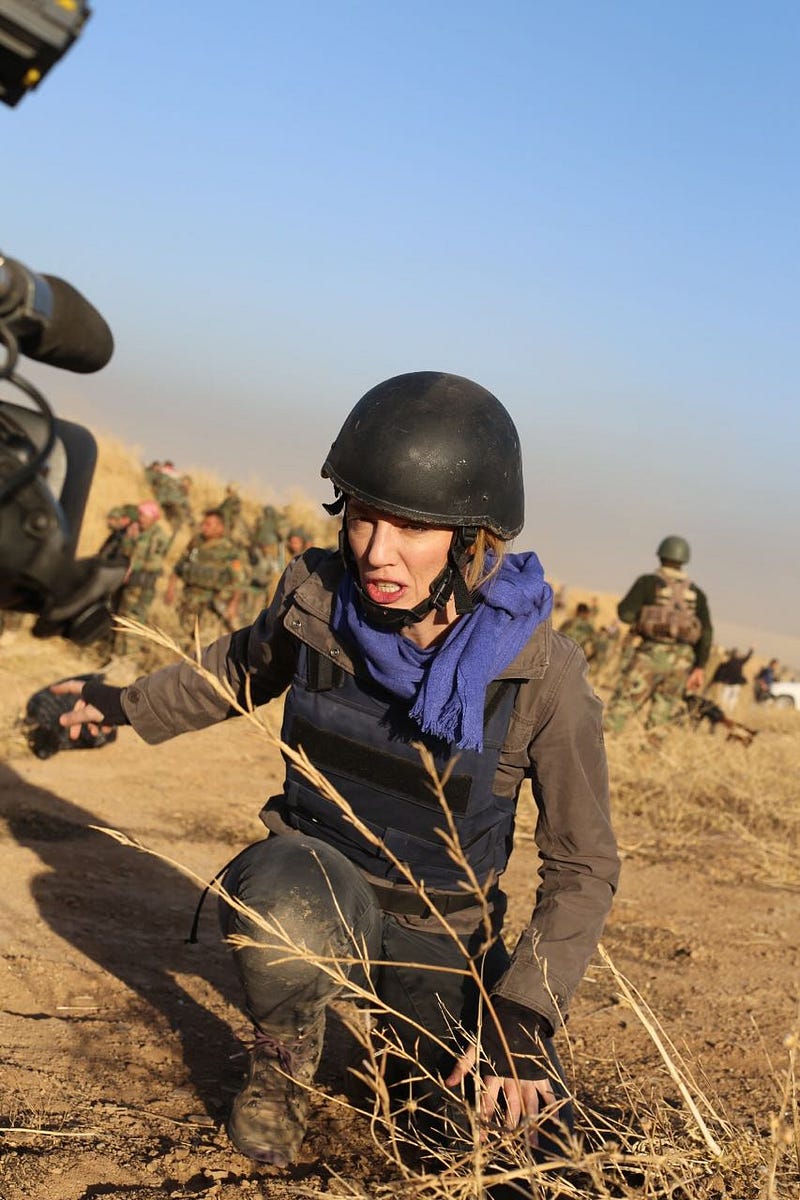
‘There are rare moments where you feel like you are privileged to be witnessing history in front of you.’
Castello Road, nicknamed the “road of death,” is the only road that entered into rebel-held parts of eastern Aleppo, and to drive down it meant gambling with your life. The dusty-two lane highway was lined with small berms of earth, in an effort to protect cars from the gunfire being launched by enemy positions on either side of the road. As you arrived in Aleppo, you could see that the once-bustling city was now void of color and sound. Grey dust covered bombed-out buildings, and impact craters from bunker buster bombs pockmarked the ground, giving the illusion that you had arrived on an apocalyptic moon.
This journey into eastern Aleppo was described to me by CNN’s Senior International Correspondent, Clarissa Ward, during a recent interview. In late February 2016, Ward risked her life to travel to rebel-held Syria to film Undercover in Syria. The series, for which she won a Peabody award and was nominated for an Emmy award this year, provides viewers a glimpse into life in war-ravaged Syria.
In the six years since protests against Syrian President Bashar al-Assad morphed into a bloody civil war that claimed the lives of an estimated 400,000 people, Ward has traveled to Syria to cover the conflict over a dozen times. As one of the only Western journalists to have entered into rebel-controlled Syria, she has borne rare witness to the execrable and devastating destruction caused by Russian-Syrian bombardments.
As you arrived in Aleppo, you could see that the once-bustling city was now void of color and sound. Click To TweetIn war reporting, which exists as a smaller subset of foreign reporting, women like Ward are producing some of the field’s most courageous and important journalism. Yet despite their obvious skills, women continue to be underrepresented in U.S. media. The Women’s Media Center estimates that in 2015, women produced 34.9% of foreign political news, while male journalists produced 64.2%.
Elmira Bayrasli, co-founder of Foreign Policy Interrupted, an organization which seeks to break the barriers that prevent women from being involved in foreign policy, told me in a phone interview that women being disproportionately underrepresented is a systemic problem, stemming from “unintentional bias where we don’t think that women have the expertise or the chops and so we don’t seek out their expertise.”
Christina Asquith — who has been a journalist for 20 years and founded The Fuller Project for International Reporting, which produces multimedia journalism on issues impacting women globally — agrees with Bayrasli’s statement, and questions the types of stories that are valued by editors. Conflict reporting tends to be not only by men, but about men, meaning we rarely get to hear equally important female narratives. Asquith believes that raising awareness about the dearth of stories by and about women — as illustrated by data produced by organizations like The Women’s Media Centre and Nieman Foundation — can lead to change within the industry. She also believes that by reporting “kick-ass stories about issues that impact women,” female journalists themselves can help change the status quo, “because that is something that both men and women in the newsroom respect.”
The sisterhood of female foreign correspondents is small, but it consists of acclaimed and credentialed women, including not only Ward but CBS’s Holly Williams, who often reports while swathed in a flak jacket in Iraq and Syria; Danish freelancer Anne Alling; and Katherine Zoepf, a freelance journalist who spent over a decade reporting from the Middle East.

It is an especially important time to be a journalist, and particularly a female one. The need for impactful, objective, on-the-ground reporting from women has never been clearer — not only because violence, war, and terrorism continue to wreak havoc around the world, but because we live in a time when the President of the United States frequently attacks the U.S. press, issues misogynistic and sexist attack against female journalists, and calls for journalists to be jailed for their reporting.
Ward, Williams, Alling, and Zoepf are renowned for holding powerful people to account and telling stories that would otherwise go untold. Now, more than ever, their work is vital. These journalists show that women are not only capable of delivering hard-hitting news, but that they are capable of doing so in a war zone — while back in Washington, the U.S. president sits behind the gates of the White House tweeting attacks launched at their networks and colleagues.
In exclusive interviews, these four powerhouse journalists talked with me over the phone about what it is like to be a female journalist, the reality of reporting from war zones, how they cope with the aftermath of witnessing death and violence, and the difficulties of balancing motherhood with a career in journalism.

Some may assume that war journalists enter into combat zones because of bravado or an addiction to adrenaline. But for these women, covering war is a moral imperative. They push themselves into the eye of war so that they can be on the front lines of history, to bear witness to events as they unfold, and to report back so that the public may have a better understanding of the world.
Ward says that she never seeks out danger:
“I am not a frontline or adrenaline junky, I am happiest when I am talking to people and trying to get a sense of what life is like in these places. Some people get a thrill out of [war], but I do not.”
Instead, Ward says, what galvanizes her is the ability to give a voice to the voiceless — to take their stories, frame them with the necessary context and nuance, and deliver them to the public.
This work is not without peril; in fact, death while at work is a very real possibility. Reporting from war zones in Syria and Iraq is a risk that grew more potent as the Syrian civil war picked up momentum and ISIS arrived on the scene. Indeed, the past four years have been especially brutal for war correspondents who report from Syria and Iraq.
On February 22, 2012, Marie Colvin, the preeminent war correspondent, was killed by Syrian President Bashar al-Assad’s military forces while covering the Siege of Homs. Colvin, who reported for The Sunday Times, is revered for her bravery and fearlessness in the field. In 2001, while on assignment covering the conflict between government forces and Tamil Tigers in Sri Lanka, she lost her left eye when shrapnel from a grenade ripped through her socket. Yet, months later, she was back at work, reporting from conflict zones with a black eye patch and a reporter’s notebook in hand.
According to the Committee to Protect Journalists, Colvin is just one of the 113 journalists who have been killed in Syria since the start of the conflict in 2011. This includes the August 2014 murders of American freelance journalists, James Foley and Steven Sotloff, who were both executed by ISIS. The deaths of journalists such as Colvin, Foley, and Sotloff raise the subject of safety when it comes to war reporting: How do media organizations protect their journalists while they are in war zones, and for freelance journalists who do not have the protection of a media network behind them, is war reporting worth the risk?
Both Ward and Williams have the protection of news networks behind them that can afford to provide top-level security for correspondents, and which demand that their journalists develop meticulous logistics for security before departing for conflict zones. Ward says that her trip to Ariha, Aleppo, and Daraat Izza in besieged Syria in February 2016 took months for her plan, and that she only presented the idea to her bosses once she had all the details worked out for collecting the story while remaining as safe as possible. As she told me:
“It’s like cracking a safe. You are thinking about every eventuality, every possibility in terms of security — what is the best job you can do to mitigate all the risks, what risks haven’t I thought about, and what are the rewards for the story that I am going to get?”
Ward confirmed that CNN’s security is “extremely rigorous,” and includes “multiple check-ins, tracking devices, and every possible security precaution you could imagine.” For Williams, who spoke with me via a satellite phone while she was reporting from Iraq, having a trusted network of local staff and contacts in the conflict zones is vital to her safety. “A lot of it is building relationships and being able to trust the people you are with, and how much you can ensure that they also want you to come back alive and in one piece, “ she says of her network of sources in Syria.
Despite the intense security provided to Ward and Williams, attempts at remaining completely safe in Syria are impossible. Most crucially, you cannot mitigate for airstrikes favored by the Syrian-Russian military, which — while ostensibly aimed at targeting rebel forces and terrorists — have often killed civilians.

When she first detects the sound of an airplane overhead, Ward says she is overcome with a sickening feeling of dread and powerlessness, because she knows a bomb is about to drop and her life and those around her are at risk. “The [air strikes] are the scary part,” she says. “You just hear the planes coming and you look around and see where you can take cover and you just hope you are going to be okay.”
War reporting for journalists like Williams and Ward, who are backed by media networks, remains dangerous, even with the support of security teams. But for freelancers who arrive in conflict zones without understanding how perilous war zones are, the danger only increases. Ward’s advice for freelancers who want to report from Syria is simple — “Don’t go,” she says. Ward, who was friends with James Foley, worries about freelancers who do not have the proper first-aid training or body armor, who lack the experience and language skills to safely navigate conflict zones, and who don’t have adequate health insurance to cover emergency care while in the region and services once out. “We as an organization and freelancers, in general, all need to do a better job making sure [reporting] is done in a responsible way,” Ward says.
With the founding of The War Zone Freelance Project (WZF), freelance Danish journalist Anne Alling is hoping to do just that. Alling co-founded WZF as a way to provide affordable journalistic medical training to freelance journalists. “It is crazy dangerous for journalists to go to conflict zones without [medical] training,” says Alling. Yet medical training and medical kits can costs freelancers thousands of dollars, a price which inhibits many from seeking proper training. To remedy this, WZF provides training for as little as $60.
Even with proper medical training, Alling warns that freelancers must realize that they are responsible for ensuring their own safety. While freelancing, Alling lived in Irbil, Iraq, during the Mosul offensive, during which Iraqi forces fought a battle from October 2016 until July 2017 to retake the city from Islamic State militants. During this period, Alling says, she often weighed the risks and rewards of covering a story before entering a war zone:
“There are times when I don’t want to take the risk and so I don’t go into Mosul every day. I only take assignments that I know I can sell afterward, and even then I will go [to Mosul] with other journalists who have a plan and are medically trained.”
For Williams, being a mother adds extra weight to her decision on whether or not to report from a conflict zone. “I am a mother; I have a family, people in my life who need me and who I love. When there is a good story, I do want to tell that story, but I really don’t want to risk my life telling that story,” she says. Like working mothers (and parents) all over the world, Williams faces the constant struggle to balance her career with her personal life.
In 2012, Williams gave an interview to The Daily Beast about her choice to return to work within weeks of giving birth to her daughter. In the article, she describes pumping breast milk while in the jungles of Burma. “I was sitting in the back of a taxi with a breast pump. I was weeping and telling myself, ‘Don’t cry — that’s dehydrating,” Williams said in the article. The story was then picked up by a British tabloid, and the backlash that followed was fierce. “Women can’t have it all — children are a full-time job, if you don’t want the job, don’t have kids!” wrote one commenter.

Williams says she originally consented to The Daily Beast interview to explain that by going to work so soon after giving birth, she did herself and other women a disservice. “Women have babies and if we want women to be in the workforce we need to accept that women shouldn’t have to go back to work three weeks after giving birth,” she says.
Katherine Zoepf, who worked as a reporter in The New York Times’ Baghdad bureau before her children were born, pointed out that, though the image of the female war correspondent who leaves her children in order to work in conflict zones arouses fascination, it’s one that few of the women who combine motherhood and foreign assignments actually resemble. For most, Zoepf says, the greatest challenge isn’t leaving their children for long periods of risky reporting, but the daily struggles that come with, well, not leaving their children. “Kids are incredibly time consuming, and so is reporting,” she says. For Zoepf, a single mother, getting writing done often requires her to work unsociable hours. “I pull a lot more all-nighters now, more than I ever did in college.”
Zoepf says that some of her female colleagues take their children with them on reporting trips. She has done this, too, on several assignments in the Middle East, albeit quietly:
“Sometimes people have this picture of a region that is uniformly in conflict, and they imagine it’s difficult or irresponsible to bring children. With editors, it always seemed best to avoid mentioning that the baby was coming. You don’t want anyone to worry that you’ll be distracted.”
But when editors at The New Yorker learned that Zoepf’s two-month-old son William was accompanying her on a reporting trip to Saudi Arabia, they surprised her by being not only supportive, but enthusiastic. “I think they found it sort of hilarious,” she says.
In many ways, these obstacles resemble those faced by working mothers in every field. But for war correspondents, there is a crucial added stresser: When they return home from work, they are often returning from war zones having witnessed death and violence. Williams, Ward, and Alling admit that bearing witness to human suffering affects them emotionally, which at times can impact their personal life. Ward says that her heart has been broken “100 times over and over” by what she has witnessed during her reporting in Syria. “It can be difficult to relate to my normal life after spending time [in Syria] because it is so abstract and so different,” she adds. Ward copes with the trauma with the support of her family and husband. “I also like to do silly things like go out dancing, or going to an art exhibition,” she says.
Alling says that the everyday difficulties of living in Iraq, such as the lack of hot water and internet interruptions, coupled with the constant violence and death, have left her feeling deeply tired at times. “There is a constant awareness of this being a horrible place in many ways where lots of horrible things happen.”
Ward says that her heart has been broken ‘100 times over and over’ by what she has witnessed during her reporting in Syria. Click To TweetPrior to our interview, Alling had spent the day shopping in Iraq. On her way home from the mall, she was sitting the back of a taxi and was suddenly overcome with exhaustion. “Why am I so fucking tired?” she thought. “Then I remembered that it’s because I do heavy stuff and that weighs on me.”
Many would assume that female war correspondents must face unique barriers reporting from some of the most violent places in the world for women. And Ward indeed confirms that being a woman is an obstacle if she is seeking an interview with a head of a jihadist faction. “It pisses me off,” she says, “but the world is an imperfect place.”
But interviews with heads of terrorist networks aside, all of the journalists interviewed for this story insist that in many ways, being a woman allows them access to stories and sources that they would otherwise not have had if they were men. Zoepf, for instance, has been able to conduct interviews with women in Saudi Arabia that her male colleagues could not, because women there can’t freely interact with men outside of their own home.
“For the most part I feel like it is advantageous,” Ward says of being a female war correspondent. “I think it allows me to move under the radar; people are not looking at women thinking they must be a journalist.”
War reporting consists of witnessing trauma and danger while attempting to balance a normal family life back on the home front. Yet despite all this, Ward, Williams, Alling, and Zoepf are fiercely dedicated to their work.
Says Ward: “It is not glamorous, but there are rare moments where you feel like you are privileged to be witnessing history in front of you. I think that’s what causes a lot of us to do this job.”

